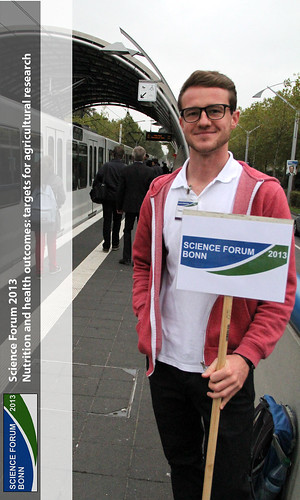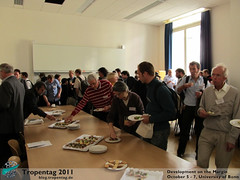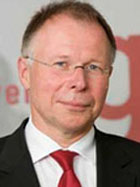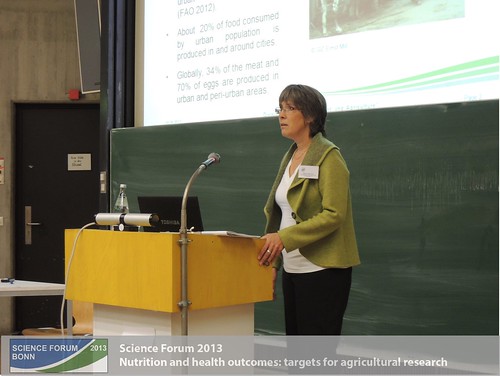GIZ
“Saving food saves resources”— Tanja Pickardt
Mon, 09/22/2014 - 21:01 — Pramila Thapa
‘In general, one-third of the food produced is lost’ said Tanja Pickardt during a presentation at Tropentag. According to FAO, loss varies with type of the food produced. For example, the loss in grain is less as compared to fruits, vegetables, and dairy products. Pickardt said that it is necessary to quantify the food loss before making policy decisions, but it is very difficult to quantify the actual quantity of food wasted. To illustrate this point, she showed a video by FAO titled "Food Wastage Footprint 2". The environmental and social consequences are more difficult to quantify than economic losses. Also in this video, we can see different ways to reduce food loss and alternative uses of wasted food.
 (Continue...)
(Continue...)
 (Continue...)
(Continue...)
Student Assistants at Science Forum 2013
Wed, 09/25/2013 - 15:07 — Xi Zhao
When you arrived at the metro station for the Science Forum 2013 in Bonn, you will always be warmly welcomed by two or three young students. Therey are some of the 12 student assistants for the Science Forum, who will tell you where to go. They have many other little tasks, such as preparing the conferece materials, and manging electronic equipment. They have made an invaluable contribution to the success of the conference.
Find out that they are actually capable of answering more question than just the way to the restroom!
Tobias Gerhartsreiter, studying Geography as a master student at Wuerzburg University, is doing an internship at GIZ (Deutsche Gesellschaft fuer Internationale Zusammenarbeit). He is looking forward to improving skills for a future career at GIZ.
 Vandasue Rodrigues, from Bangalore of India, is a master student in Plant Sciences at University of Bonn. She has been in Germany for two years. She enjoys meeting people from all of the world with different cultural backgrounds.
Vandasue Rodrigues, from Bangalore of India, is a master student in Plant Sciences at University of Bonn. She has been in Germany for two years. She enjoys meeting people from all of the world with different cultural backgrounds.

 Vandasue Rodrigues, from Bangalore of India, is a master student in Plant Sciences at University of Bonn. She has been in Germany for two years. She enjoys meeting people from all of the world with different cultural backgrounds.
Vandasue Rodrigues, from Bangalore of India, is a master student in Plant Sciences at University of Bonn. She has been in Germany for two years. She enjoys meeting people from all of the world with different cultural backgrounds.

GIZ projects to promote urban agriculture
Thu, 09/19/2013 - 10:22 — Louisa WongGIZ – Resilience is about decreasing vulnerability
Thu, 09/20/2012 - 15:30 — De-Registered User
On Tropentag 2012, the GIZ presents its different approaches to enhance resilience in agricultural systems by depicting some fields of action.
The key-factor opposing resilience in rural development is the vulnerability of agricultural systems. The approach to decrease vulnerability acquired by the GIZ comprises economic, political and ecological as well as social aspects. Thus, it is distinct from approaches that focus only on ecological resilience of agricultural systems.
Presenting experiences gained in Afghanistan, it was analyzed what development work needs to consider in a fragile state that faces insecurity, lack in welfare and political guidance. Key findings were that firstly main components in livelihood need to be assessed and respective main problems need to be identified. Then, taylor-made approaches that are sensitive to the traditional structures can be applied. Also of importance is the long-term commitment to the development.
Finally, the new public knowledge platform agriwaterpedia.info is presented. It aims at overarching gaps between different sectors and on the other hand filling the general knowledge gap. The target group of the platform are young professionals and practitioners that can share knowledge on their respective field of experience.
Jobs opportunities or finding potential candidates?
Thu, 10/06/2011 - 17:41 — De-Registered User
As every year, the meeting of “Friends of CGIAR” took place in Tropentag 2011. "This public event is a great opportunity for networking, job opportunities and update of current news of the 15 centers of the Consultive Group on International Agricultural Research, CGIAR” said Prof. Dr. Asch, University of Hohenheim.
 Brigitte L. Maass, from CIAT- International Centre for Tropical Agriculture-, speaking in four languages showed her friendly predisposition for contacting with researches from everywhere. She is an agronomist specialized in forage. She was talking with Erica, a Colombian student who is making his master in Germany. Erica was asking for potential field work “I want to make my field work in Colombia for my thesis”. Brigitte was working in Colombia for many years as a young scientists. And now, she is located in Nairoby, Kenia. Something will work out of this meeting!
Brigitte L. Maass, from CIAT- International Centre for Tropical Agriculture-, speaking in four languages showed her friendly predisposition for contacting with researches from everywhere. She is an agronomist specialized in forage. She was talking with Erica, a Colombian student who is making his master in Germany. Erica was asking for potential field work “I want to make my field work in Colombia for my thesis”. Brigitte was working in Colombia for many years as a young scientists. And now, she is located in Nairoby, Kenia. Something will work out of this meeting!
 Brigitte L. Maass, from CIAT- International Centre for Tropical Agriculture-, speaking in four languages showed her friendly predisposition for contacting with researches from everywhere. She is an agronomist specialized in forage. She was talking with Erica, a Colombian student who is making his master in Germany. Erica was asking for potential field work “I want to make my field work in Colombia for my thesis”. Brigitte was working in Colombia for many years as a young scientists. And now, she is located in Nairoby, Kenia. Something will work out of this meeting!
Brigitte L. Maass, from CIAT- International Centre for Tropical Agriculture-, speaking in four languages showed her friendly predisposition for contacting with researches from everywhere. She is an agronomist specialized in forage. She was talking with Erica, a Colombian student who is making his master in Germany. Erica was asking for potential field work “I want to make my field work in Colombia for my thesis”. Brigitte was working in Colombia for many years as a young scientists. And now, she is located in Nairoby, Kenia. Something will work out of this meeting!
Meet the Speakers: Dr. Hans-Joachim Preuß
Wed, 07/13/2011 - 18:31 — De-Registered User Hans-Joachim Preuß is the Managing Director of the Deutsche Gesellschaft für Internationale Zusammenarbeit (GIZ). He holds a PhD from
Justus Liebig University in Giessen, under the topic of target group-oriented agricultural research in developing countries.
Dr. Preuß started his professional career in development cooperation at the GTZ, holding various positions in Africa and at the GTZ Head Office in Eschborn, also as a member of the Corporate Development Unit. He was transferred at Welthungerhilfe in Bonn, where he was initially in charge of the Programmes and Projects Department and later Secretary General and Managing Director. In 2009, Dr Preuß was appointed Managing Director of GTZ.
Hans-Joachim Preuß is the Managing Director of the Deutsche Gesellschaft für Internationale Zusammenarbeit (GIZ). He holds a PhD from
Justus Liebig University in Giessen, under the topic of target group-oriented agricultural research in developing countries.
Dr. Preuß started his professional career in development cooperation at the GTZ, holding various positions in Africa and at the GTZ Head Office in Eschborn, also as a member of the Corporate Development Unit. He was transferred at Welthungerhilfe in Bonn, where he was initially in charge of the Programmes and Projects Department and later Secretary General and Managing Director. In 2009, Dr Preuß was appointed Managing Director of GTZ.





